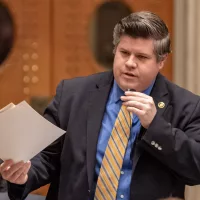
A proposal to open school district boundaries garnered five hours of discussion Wednesday without resolution
BY: ANNELISE HANSHAW
Missouri Independent
The split among Senate Republicans over a bill allowing Missouri students to enroll in neighboring school districts widened to a chasm they could not bridge Wednesday after the legislation was tied to an obligation to fully fund public education.
The state Senate debated the legislation, dubbed “open enrollment,” for five hours, finally setting it aside when no agreement could be reached.
When the bill passed the Missouri House in March for the fifth consecutive year, 22 of the chamber’s 110 Republicans voted against it. A similar split in the Senate, combined with Democratic opposition, led to Wednesday’s impasse.
The debate marked the first time it reached full Senate.
The bill’s House sponsor, state Rep. Brad Pollitt, a Republican from Sedalia, has fine-tuned the bill over the years to settle concerns and win over GOP skeptics.
At its core, the legislation would allow school districts to enroll students outside of its boundaries to fill open seats and collect the state funding for those students. Provisions like the maximum number of students that could leave their home district each year have changed over time, with the House passing a 3% cap on departing students and a Senate committee giving the cap room to expand to 5% in some situations.
Any changes made in the Senate will need to win approval in the House, where the margin is very slim. And the bill brought to up for debate Wednesday by state Sen. Curtis Trent, a Springfield Republican, is loaded with changes reaching into other K-12 education matters.
Pollitt told The Independent that he was part of discussions in both the Senate committee substitute and the floor substitute, confident the changes wouldn’t kill the legislation if it returns to the House.
Behind closed doors, the 22-page bill approved by the House ballooned into a 107-page education package negotiated without input from Senate Democrats.
Senate Minority Leader Doug Beck, a Democrat from Affton, said he received a copy of the bill shortly before the Senate convened.
“This large piece of policy is coming before the body, and we haven’t even had a chance to have input on it, which we’ve done in the past on numerous big bills around here that you know about,” Beck said. “We are basically shut out of this process.”
Trent said school districts and other stakeholders were consulted, adding that Beck could offer amendments on the floor.
Beck challenged Trent’s confidence in the negotiations.
“I don’t think there’s consensus in your own caucus on this bill,” he said, saying Senate Republicans had asked him if he was going to “kill this thing.”
The division emerged when state Sen. Lincoln Hough, the chamber’s other Springfield Republican, added provisions that would pause open enrollment in years that the state does not fully fund the formula that determines state aid for public schools. The pause, under Hough’s additions, would also occur if teacher salary grants or district transportation costs were not fully funded.
“This body has a tendency to pass laws and then not necessarily… financially support the legislation that we adopt,” he said.
Hough, the appropriations committee chairman, is the Senate’s top voice on spending. His amendment, he said, would ensure that future state lawmakers adequately support funding that is key to public education and the operation of an open-enrollment system.
Trent called the amendment a “special carve out” that could hinder future senators.
“I don’t think that we should second guess the judgment of future general assemblies, nor should we hold a good idea hostage to arbitrary standards such as this,” he said.
The narrow votes on Hough’s proposals showed the depth of the split. The transportation funding requirement was added on a 15-13 vote, then it and the other two requirements were approved 14-13.
The standing division vote did not record individual members’ positions, but objections were raised when state Sen. Mary Elizabeth Coleman, a Republican from Arnold, refused to take sides. Coleman raised a “point of order,” and Senate President Pro Tem Cindy O’Laughlin of Shelbina ruled that Coleman was within the rules.
Pollitt did not comment on Hough’s amendments, saying only that he feels confident in the financial considerations because districts have to opt in to participate.
“If they take kids one year and finance has changed drastically, then come around November 1 the next year, they can say, ‘You know what, we’re not going to opt in again,’” Pollitt said. “But those kids (already enrolled) get to stay.”
Before the bill was laid over, Democratic Sen. Maggie Nurrenbern of Kansas City offered an amendment that would exclude charter schools from open enrollment. The inclusion of charters was not part of the version approved by the House and was added in the Senate Education Committee.
Pollitt said he wasn’t opposed to including charter schools in the legislation, since lawmakers added provisions that would protect local tax dollars from going to students outside the district who enroll in a charter school.
Nurrenbern’s amendment did not come to a vote.



